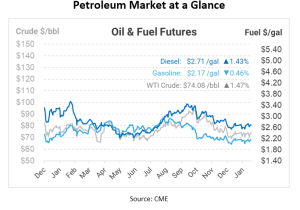
Fuel Additives: Boosting Cold-Weather Performance and Efficiency
As the cold months set in, many fleet owners and operators start to feel the effects of frigid temperatures on their vehicles’ performance and fuel efficiency. Cold weather can be tough on engines, leading to reduced fuel efficiency, slow starts, and increased wear and tear. However, there’s a solution that can help combat these issues – fuel additives.
In today’s article, we will explore how fuel additives can improve cold-weather performance and efficiency, making your winter drives smoother and more cost-effective. Click here to learn more about effective fueling strategies to stay ahead of winter.
The Challenge of Cold Weather
Cold weather presents several challenges for vehicles. When the temperature drops, the oil thickens, making it harder for the engine to turn over. This results in slower starts and increased strain on the battery and starter motor. Additionally, cold air is denser, which can affect the air-fuel mixture and combustion process, leading to reduced fuel efficiency.
Fuel additives are specially formulated chemicals that can be added to your vehicle’s tank to enhance the properties of the fuel. When it comes to cold weather, fuel additives can provide several benefits:
- Improved Fuel Combustion: Some fuel additives contain detergents and cleaning agents that help keep fuel injectors and combustion chambers clean. This leads to more efficient fuel combustion, even in cold conditions.
- Fuel Stability: Cold temperatures can cause fuel to become unstable and prone to forming deposits. Fuel additives can stabilize the fuel, preventing the formation of dirt that can clog injectors and reduce engine efficiency.
- Water Removal: Water in the fuel system can freeze and cause blockages. A water dispersant controls water accumulation and functions as a water “anti-freeze” during severe cold temperatures.
- Cold-Start Assistance: Fuel additives can also help improve cold starts by reducing the thickness of engine oil, making it easier for the engine to turn over. This can extend the life of the battery and starter motor.
- Fuel System Lubrication: Cold weather can increase friction within the fuel system. Some fuel additives contain lubricating agents that reduce friction, helping the engine run smoother and more efficiently.
Choosing the Right Fuel Additive
When selecting a fuel additive for cold-weather use, it’s essential to consider your specific needs and the climate in your area. When properly blended, additives modify the structure of the waxy molecules in the fuel, preventing them from glomming together and creating filter-plugging sheets.
Mansfield offers a full range of products and proactive services to ensure high-quality fuel for your fleets, including Arsenal Additives, Tank Cleaning, Repair and Maintenance, Fuel Testing, and Fuel Treatment. Mansfield experts will analyze your fleet and fuel needs and your organizational goals to give you a recommendation for a customized prescriptive additive and fuel quality program. Contact us today!

This article is part of Daily Market News & Insights
Tagged:
MARKET CONDITION REPORT - DISCLAIMER
The information contained herein is derived from sources believed to be reliable; however, this information is not guaranteed as to its accuracy or completeness. Furthermore, no responsibility is assumed for use of this material and no express or implied warranties or guarantees are made. This material and any view or comment expressed herein are provided for informational purposes only and should not be construed in any way as an inducement or recommendation to buy or sell products, commodity futures or options contracts.





